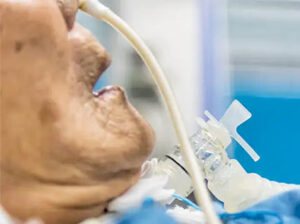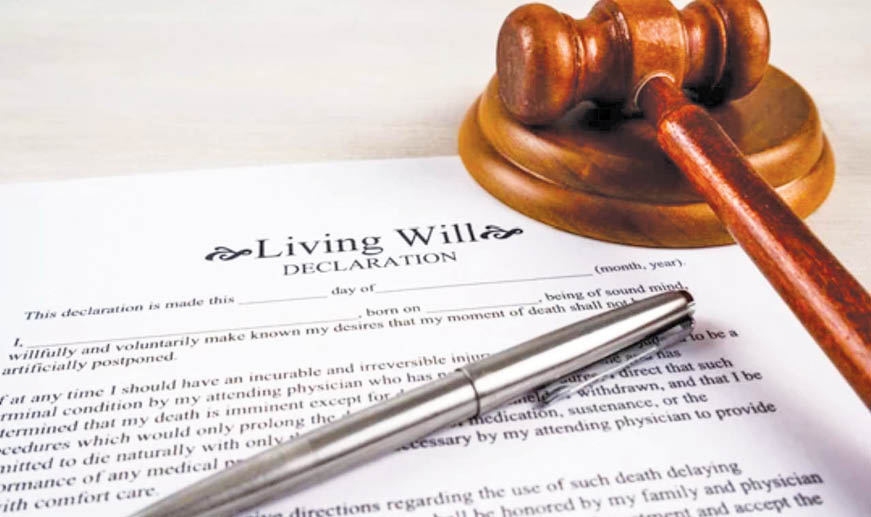Commanding over twenty years of experience as a practicing Corporate Advocate, Adv. Aazmeen Kasad also shares her expertise as a Professor of Law, for fifteen years now. She looks forward to answering any of your legal queries (editor@parsi-times.com). Follow her legal updates on Twitter @Aazmeen.
.
 One of the oft-discussed topics by many senior citizens these days is the need to make a ‘Living Will’. A ‘Living Will’ is an advance directive in the form of a legal document, in which you state your preferred future medical treatment in circumstances when you are incapacitated or unable to express your informed consent / decisions yourself.
One of the oft-discussed topics by many senior citizens these days is the need to make a ‘Living Will’. A ‘Living Will’ is an advance directive in the form of a legal document, in which you state your preferred future medical treatment in circumstances when you are incapacitated or unable to express your informed consent / decisions yourself.
There are numerous reasons why people consider making a Living Will, including (i) the dis-inclination of the individual to be on life-support machines when their body is medically unable to recover; (ii) the cost implications of a prolonged life treatment on medical support; and (iii) its emotional, mental and physical on one’s kith and kin.
So, what exactly is a ‘Living Will’? How did the concept evolve? What is the legal position on it? What laws govern it? When and by whom can it be executed? Read on…
It is relevant to note that ‘Euthanasia’ is of two kinds – Active and Passive. In active euthanasia, a specific overt act ‘is done’ to end the patient’s life, whereas in passive euthanasia, something is ‘not done’ which is necessary for preserving a patient’s life. Euthanasia has been the subject of debate since time immemorial, with the four main aspect of this debate being religious factors, judgement of the physician, ethics, and the right to die. Thus, only some countries have legalised passive euthanasia, either by legislation or by judicial interpretation, with certain conditions and safeguards.
The Medical Treatment of Terminally-ill Patients (Protection of Patients and Medical Practitioners) Bill, 2016, was introduced by the Ministry of Health, India to address aspects of passive euthanasia. The Supreme Court has laid down some key guidelines / safeguards for making one’s Advance Medical Directive / Living Will. These mandate the adult to be of sound mind and in a position to communicate, relate and comprehend the purpose and consequences of executing the document. They should state their decision relating to the circumstances, as also state when medical treatment shall be withdrawn or if no medical treatment is to be administered, and provide specific and unambiguous instructions.
They would also need to disclose that the executor has understood the consequences of executing the document; and name a Guardian / Close Relative to give consent to refuse / withdraw the medical treatment (in the event the named executor becomes incapable). The last (most recently signed) Living Will / Advanced Medical Directive would be the one to be executed and it would need to be signed before 2 witnesses. It would also need to be counter-signed by the jurisdictional Judicial Magistrate of First Class (JMFC), so designated by the concerned District Judge.
The JMFC and witnesses would record that the document has been executed voluntarily. He would also preserve one copy of the document in his office, in addition to keeping it in digital format. The JMFC would inform immediate family members of the executor to make them aware of the document as also share a copy of the document with the family physician, the municipality / Panchayat / Municipal Corporation.
The Supreme Court has also laid down guidelines on how the Advance Directive / Living Will is to be given effect to, once it is made, thus:
If the individual who made it, becomes terminally ill, with no hope of recovery or cure, the Physician shall give effect to the Living Will, as per the instructions on the document. The Guardian, close relatives of the individual will be informed by the Physician of the nature of the illness, the alternative forms of treatment and the consequences of being left untreated.
A Medical Board shall be constituted consisting of extremely senior doctors (head of the treating department and at least 3 experts) with minimum 20 years of experience, to visit the individual and form a preliminary opinion on whether to certify the instructions of withdrawal or refusal of further treatment. Once the Medical Board of the hospital certifies that the instructions in the Living Will ought to be carried out, the hospital will inform the Collector about it, who will then constitute another Medical Board comprising the Chief District Medical Officer and at least 3 expert doctors with experience in critical care, having minimum 20 years of experience, to visit the hospital. If they concur with the Medical Board of the hospital, they will endorse the certificate to carry out the instructions in the Living Will.
After complete due diligence by the Collector’s Medical Board, the JMFC will visit the patient and after examining all aspects, shall authorise implementation of the decision of the Board. If the Living Will / Advance Directive is not clear and is ambiguous, the Medical Board will not give effect to it. Where the hospital’s Medical Board takes a decision not to follow the Living Will when treating a person, then it shall make an application to the Collector’s Medical Board for consideration and appropriate direction. In such a case, the individual-patient or his family members or even the Physician or hospital staff can file a Writ Petition under Article 226 of the Constitution of India. The matter will be heard and adjudicated upon by a division bench of the High Court.
The individual who has drafted the Living Will can revoke his / her consent to it at any time before it is implemented. The individual who has drafted the Living Will can withdraw or alter the Living Will at any time in writing by following the same procedure that was adopted in making it.
The Supreme Court bench also held that the guidelines / safeguards will remain in force till the legislation is passed in the Parliament to govern the matter. While the process to make the Living Will and subsequently, to execute it, may seem extremely complex and long-drawn, it has been intentionally done so, keeping in mind the fact that life is precious and any intention to end life should be thought through completely by the concerned individual and his / her physician, before taking any steps in that direction.
- દિકરી એટલે બીજી માં… - 20 April2024
- નાગપુરની બાઈ હીરાબાઈ એમ. મુલાનદરેમહેરનો ઇતિહાસ - 20 April2024
- વિશ્વ ભારતી સંસ્થાન દ્વારા રતિ વાડિયાનુંસન્માન કરવામાં આવ્યું - 20 April2024
